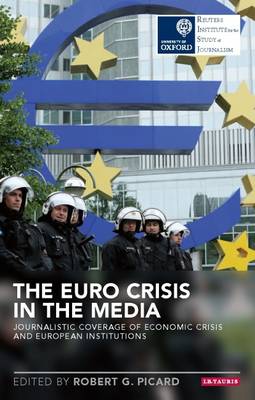 Although the continuing Euro Crisis is currently being overshadowed by the refugee crisis in Europe, its economic and political effects continue to shake the foundation of Europe and dampen national economies.
Although the continuing Euro Crisis is currently being overshadowed by the refugee crisis in Europe, its economic and political effects continue to shake the foundation of Europe and dampen national economies.
There are lessons to be learned from the way the Euro Crisis has been portrayed about European institutions, how they responds to crises, and the state of European integration and identity. A new book, The Euro Crisis in the Media: Journalistic Coverage of Economic Crisis and European Institutions, provides those lessons. The book is based on research exploring how the Euro crisis was portrayed in the European press and the implications of that coverage on public understanding of the developments, their causes, the responsibilities for addressing the crisis, the roles and effectiveness of European institutions, and the implications for European integration and identity. These have implications for the ways Europeans talk about Europe and the issues it faces.
The most important findings from the study about the ways the Euro Crisis was portrayed are:
1. It is someone else’s problem
Overall the Euro Crisis has been portrayed as foreign story, rather than a European story or a domestic story. Even in countries with sovereign debt challenges it was portrayed as a foreign story, though partly as a domestic story. The framing of stories in media asserted others as the cause of the crisis and thus shifted the problem to others to solve. It was not talked about as a common problem needing common solutions.
2. News media do not cover Europe
Euro Crisis news was framed within national narratives about the crisis and based on domestic concerns, national interests, and domestic predispositions toward the European Union. The coverage did not cover Europe, but what European developments meant to national audiences. It did not employ a broader European perspective on the issue that considered it as a European challenge requiring a European solution.
3. The crisis was portrayed as non-political
Across Europe it was portrayed as a financial and economic issue rather than a political issue. Most coverage occurred in business sections and business papers and the primary sources quoted were national government leaders and bankers/economists. Because it was not portrayed as a political crisis, the problem and solutions were thus not subject to considerable political debate and citizen’s interests were downplayed. Few leaders of political parties and civil society organizations were quoted in the press so they could not raise political issues surround the crisis and very little coverage reflected the impact of the crisis on people and small businesses. Discussion of European issues as specialised and non-political creates an environment in which citizen engagement with European issues is reduced.
4. Reporting does not well explain the European institutions, their functions, and abilities
During the Euro Crisis news coverage did not explore the mechanisms and consequences of the Euro system, the powers of European institutions, and the ability for European responses. Coverage portrayed of European institutions as important to the crisis, but as providing an ineffectual response. Discussion of the issues in this way pushed European institutions to the periphery of solution finding and supported the ad hoc responses of countries such as Germany and France in solving European issues. This does not tie citizens closer to Europe or convey a united European leadership.
5. A secondary European identity is emerging and the public wants European institutions to be effective
Despite defining their coverage and readers in national terms, news coverage across Europe did convey the presence of a secondary European identity and that the Euro Crisis posed some European challenges. Citizen’s trust in the effectiveness of the European institutions was shown to align with their national press portrayals of those institutions. Nevertheless, even though trust was declining or low overall, the average European citizen wanted the European institutions to provide leadership and answers to the Euro Crisis.
These lessons show that the press in European countries produces a discourse in which European identity and institutions are deemphasized and devalued, despite evidence that there is a desire for Europe to be more engaged and effective in solving cross-national issues. Although the study focused on Euro Crisis news, it has significant implications for the development of European governance and how future European issues might be covered.
The book is based on a research project at the Reuters Institute for the Study of Journalism at the University of Oxford, integrating researchers at universities across Europe. It is based on reviewing more than 10,000 articles published in 10 European countries (Belgium, Finland, France, Italy, Germany, Greece, Netherlands, Poland, Spain, and the United Kingdom).
Note: This article gives the views of the author, and not the position of the Euro Crisis in the Press blog nor of the London School of Economics
___________________________________________________________________
Professor Robert G. Picard is a world-leading specialist on media economics and government media policies. He is the author and editor of 28 books, and has been editor of the Journal of Media Business Studies and the Journal of Media Economics.
___________________________________________________________________
Related articles on LSE Euro Crisis in the Press:
Eurosceptics at a Junction: Antagonising the EU for the Sake of it is Risky
God in Berlin, Newton in Brussels: On the Power of Linguistic Images in the Eurozone Crisis



